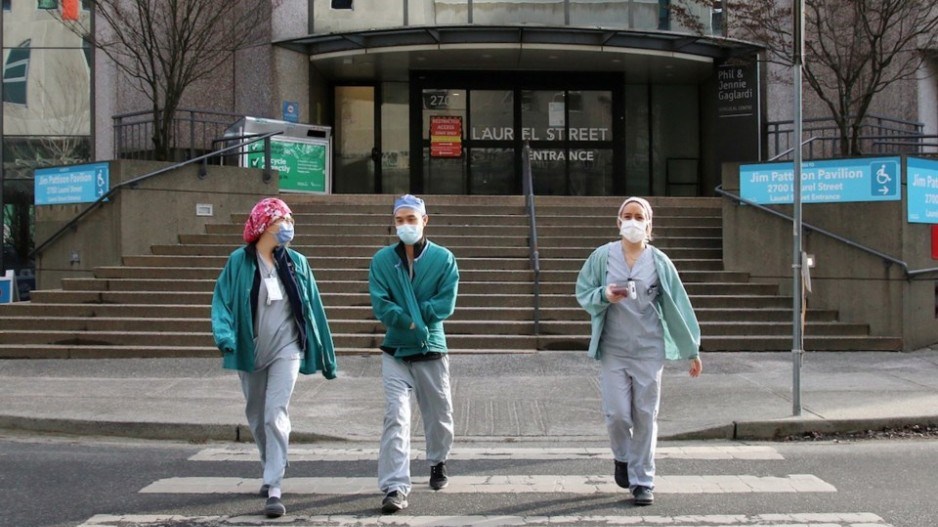In 2019, when Research Co. and Glacier Media started tracking the perceptions of British Columbians on the health care system, only 12 per cent of the province’s residents were deeply dissatisfied, claiming that it had so much wrong with it that we needed to completely rebuild it.
British Columbians then endured a global pandemic.
In 2020 and 2021, the province was usually near the top on indicators such as confidence in the provincial government to manage COVID-19 and trust in public officials. Still, by 2022, the proportion of the province’s residents who yearned for a complete rebuild of the health care system increased to 31 per cent.
When we asked British Columbians last month, we did not see a return to the buoyant mood of 2019. For three-in-ten British Columbians (30 per cent, down one point), health care in the province has so much wrong with it that it requires a complete rebuild.
Only 10 per cent of the province’s residents (down three points since 2022) believe health care in the province works well, and only minor changes are needed to make it work better. Most (55 per cent, up five points) feel there are some good things in health care, but some changes are required.
The regional disparities on this question suggest that certain health authorities are having an easier time than others. The proportion of British Columbians who want to completely rebuild the system reaches 41 per cent in Vancouver Island, 38 per cent in the Fraser Valley and 35 per cent in southern B.C.
These are not negligible numbers for a key feature of Canadian life, and one that is often mentioned as a source of pride.
When British Columbians are asked to pinpoint the biggest problem facing the health-care system right now, the undisputed leader is a shortage of doctors and nurses (40 per cent, down 10 points).
Fewer residents mention long waiting times (22 per cent, up four points), bureaucracy and poor management (10 per cent, unchanged), little focus on preventive care (six per cent, up two points) or a lack of a wider range of services for patients (four per cent, unchanged).
Even if the shortage of medical professionals is still the main concern for residents, the 10-point drop from 2022 to 2023 is noteworthy.
The promise of an easier path to allow foreign-trained doctors and nurses to provide their services in the province might be playing a role in the fluctuation.
Still, we are probably years away from experiencing the full effect of this policy.
There are two other findings that help explain the desperation of some residents. The proportion of British Columbians who would be willing to travel to another country to have quicker access to medical services that currently have long waiting times increased from 33 per cent in 2022 to 38 per cent in 2023.
Put differently, practically two in five of the province’s residents would entertain the option of purchasing medical services abroad. Those aged 18-34 (46 per cent) are significantly more likely to feel this way than their counterparts aged 35 to 54 (39 per cent) and aged 55 and over (29 per cent).
On the issue of paying out of their own pocket to have quicker access to medical services that currently have long waiting times, the numbers also shifted. In 2022, 40 per cent of British Columbians expressed a willingness to take the private route.
This year, the proportion has risen to 46 per cent.
The generational differences continue on this question as well, but are not as pronounced. More than half of those aged 18-34 (51 per cent) would pay to have quicker access to services, along with 46 per cent of those aged 35-54 and 42 per cent of those aged 55 and over.
The needle did not move much when British Columbians were urged to reflect on the September 2020 B.C. Supreme Court justice ruling, which stated that access to private health care is not a constitutional right, even if wait times for care under the public system are too long.
We continue to see almost half of the province’s residents (49 per cent) disagreeing with the decision – including 52 per cent of those who voted for the BC Liberals in 2020 and 51 per cent of those who supported the BC Green Party in the same democratic process.
As we head to a year that will feature a provincial election, the proportion of British Columbians who are concerned about long waiting times has decreased.
However, the proportion of British Columbians who would be willing to try a private model or travel abroad to get medical care has grown.
The fascinating aspect of analysis is that it is the province’s youngest adults who are more likely to question if waiting for care – if and when it arrives – is the desired course of action for themselves and their loved ones.
Mario Canseco is the president of Research Co.
Results are based on an online study conducted from November 9 to November 11, 2023, among 800 adults in British Columbia. The data has been statistically weighted according to Canadian census figures for age, gender and region in British Columbia. The margin of error—which measures sample variability—is +/- 3.5 percentage points, nineteen times out of twenty.




